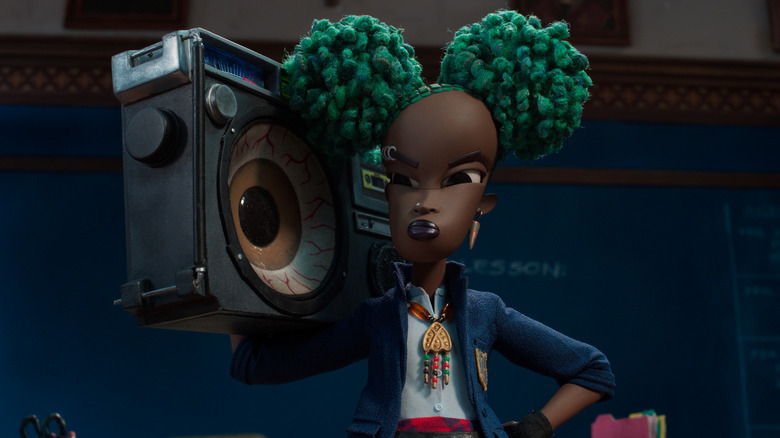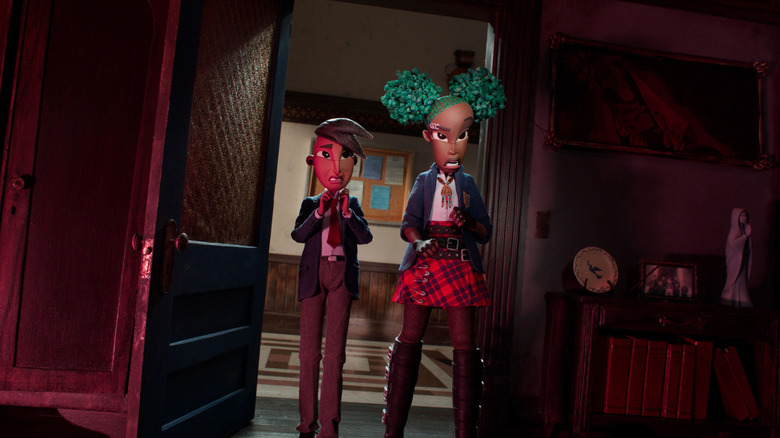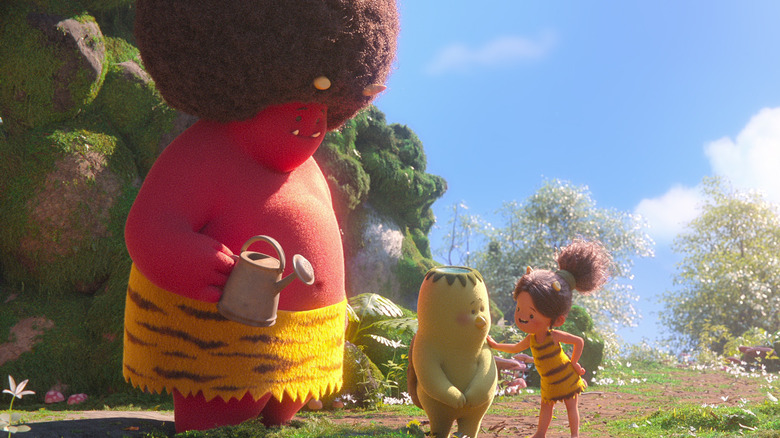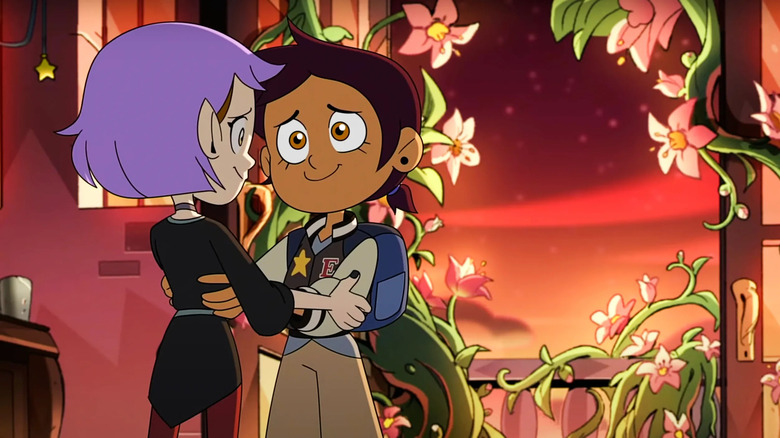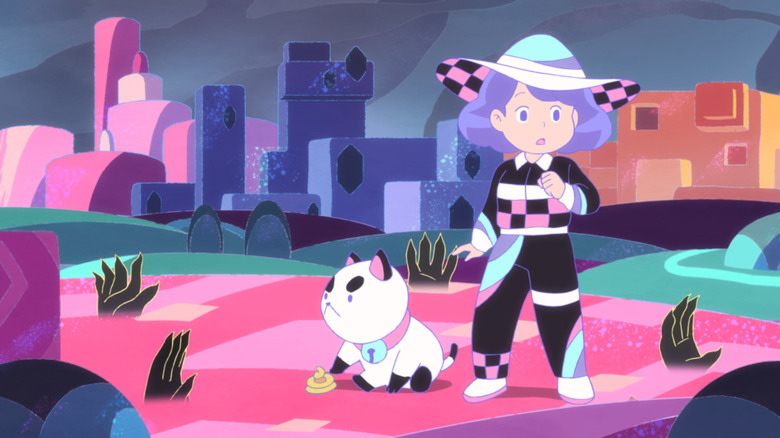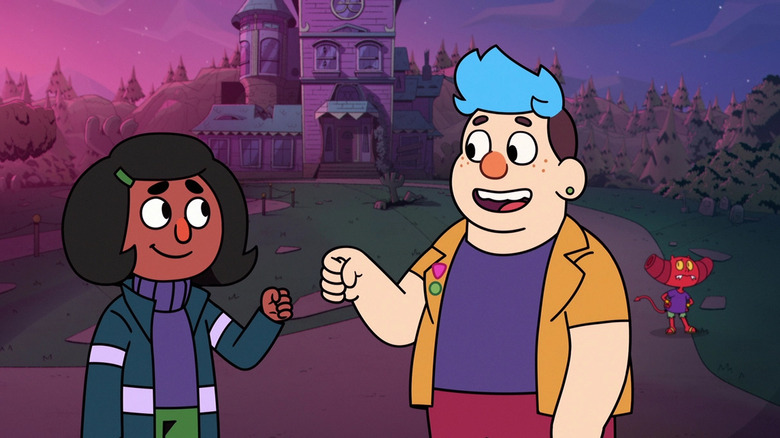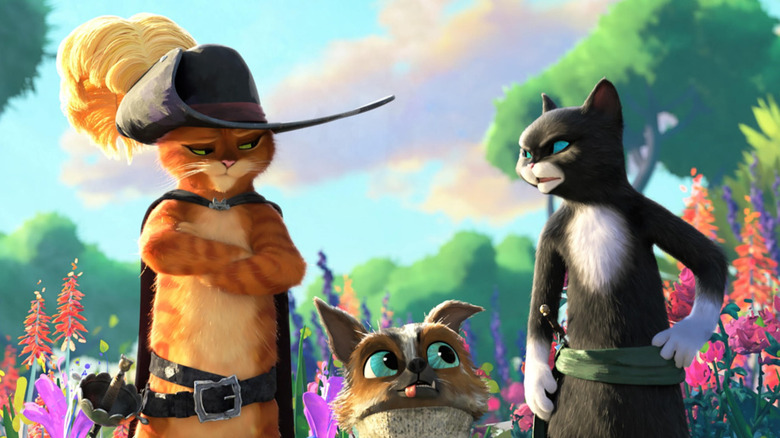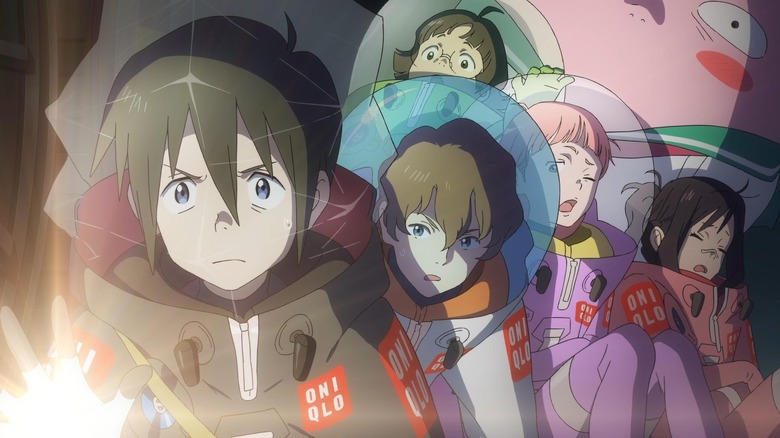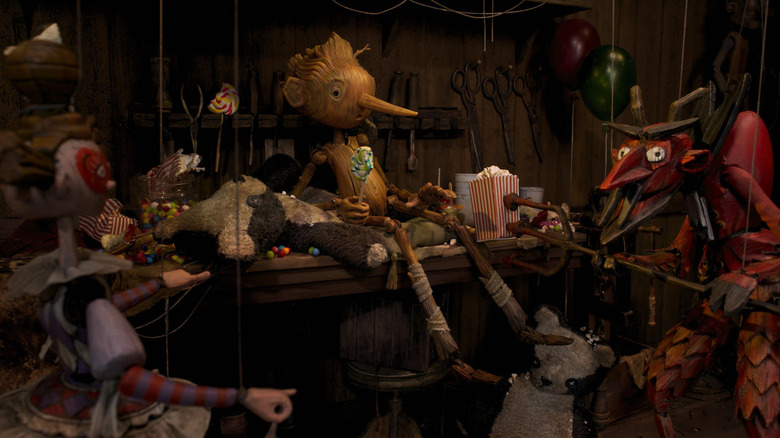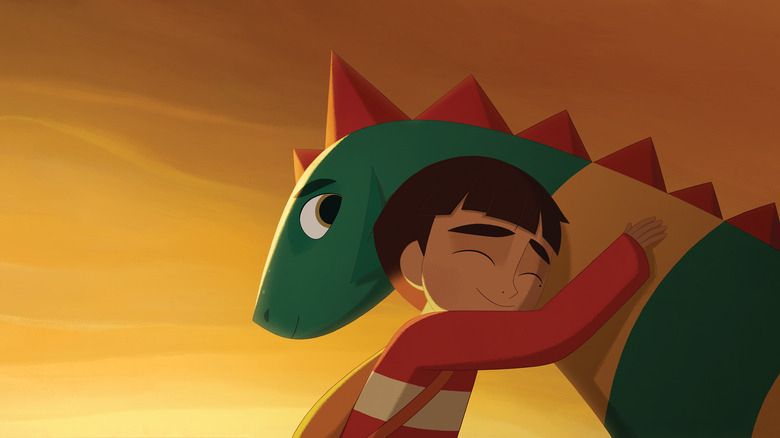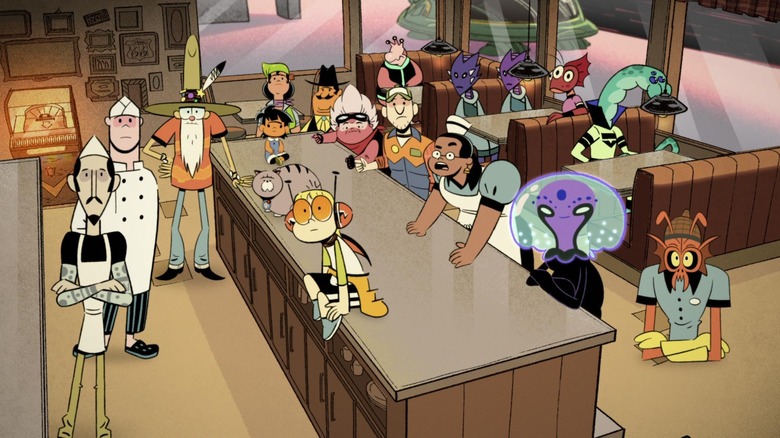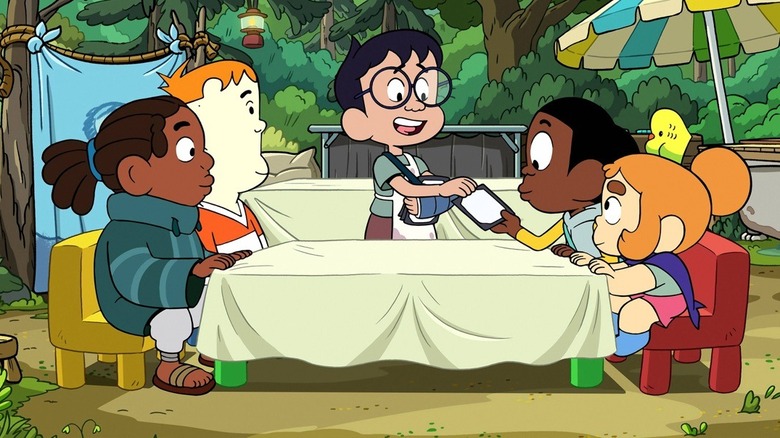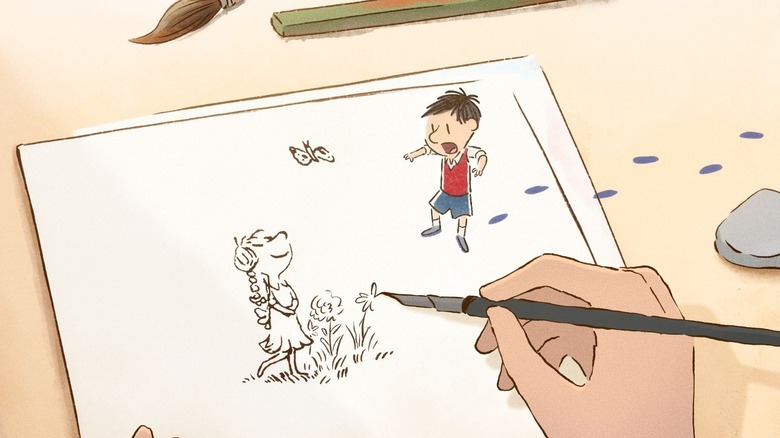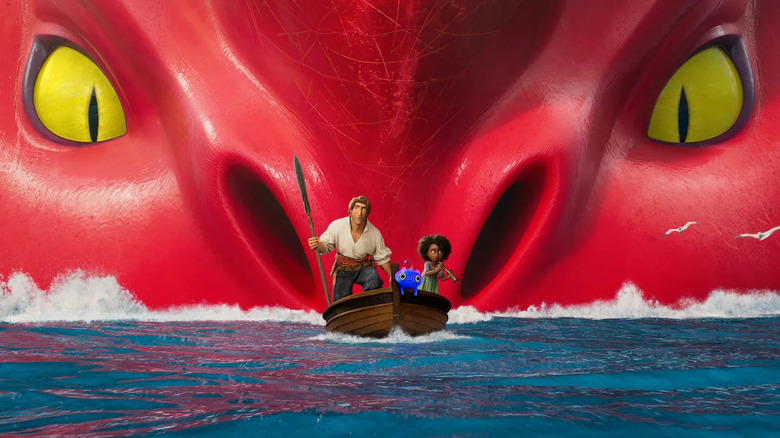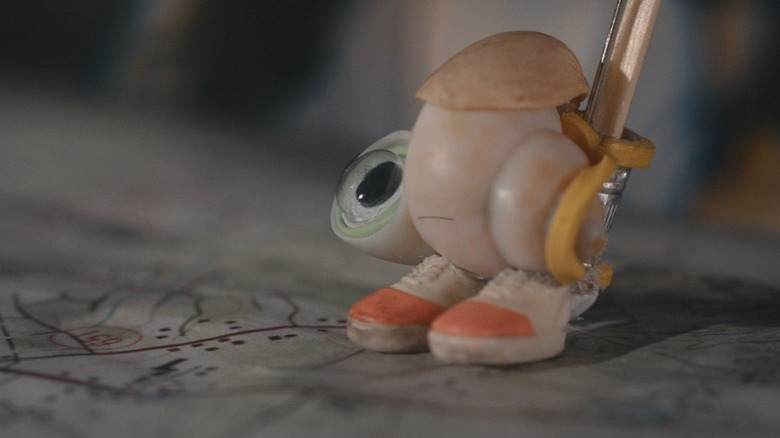The Best Kids' Animation Of 2022
Animation for children deserves more respect, especially lately. In an industry that values profits over artistic risks, kids' animation remains a dismissible art form, and the intelligence of its audience is often underestimated. In 2022, the industry faced HBO Max's purge of several animated projects, an ongoing battle for fair wages, and the abridgement or outright cancelation of numerous shows and movies. Looking back, it's hard to not wonder what might have been.
These obstacles are especially notable given how much animation aimed at children has evolved over the years. A number of 2022's animated projects were particularly inventive and thought-provoking. It was a year full of glorious stop-motion productions, breathtaking visual innovations, and major milestones when it comes to queer visibility. Just remember: For our purposes, "kids" is an inclusive term that refers to both actual children as well as the kid that exists in every adult. With that in mind, let's take a look at the best all-ages animation that 2022 had to offer.
Wendell & Wild
Henry Selick's output has never been so gruesome — and that's saying a lot when you consider that he previously directed "Coraline" and "The Nightmare Before Christmas." A movie that's definitely not for the younger kiddies, Selick's latest feature, "Wendell & Wild," is full of death. Wracked with survivor's guilt, the orphan Kat Elliot (Lyric Ross) must survive under an apathetic system when she's sent to a boarding school. Later, fate makes her a human "hell maiden," giving her the ability to summon two mischievous demons, Wendell (Keegan-Michael Key) & Wild (Jordan Peele), who may be the key to resurrecting her parents. However, the interests of greedy corporate moguls get in the way of both the demons' schemes as well as Kat's wishes.
Selick's collaboration with Peele, who contributed to the screenplay, is not just a collection of scary, dramatic gags (including some physical manifestations of trauma), but also a celebration of the marginalized people who fight the systemic racism gnawing at their communities. But that's not the end of its social commentary; "Wendell & Wild" also argues that the greed behind the prison-industrial complex is even more evil than literal hell demons. With a booming punk soundtrack, there's no better ode to society's rebels. "Wendell & Wild" can be found on Netflix.
ONI: Thunder God's Tale
What does it mean to perceive an "Oni," a type of spirit from Japanese folklore? Daisuke Tsutsumi seems to be asking this in "ONI: Thunder God's Tale," but really, that's the wrong question. What the citizens of this forest village should be wondering is whether or not they have the physical strength to fight the neighboring Oni, who are planning to attack.
As the daughter of the big red thunder god Naridon (Craig Robinson), Onari (Momona Tamada) wants nothing more than to prove the viability of her "kushi," or special abilities, to her community, which equates power with physical prowess. However, Naridon, a seemingly doltish entity, has very different ideas about strength. Across four 45-minute episodes, Onari learns about her heritage, and encounters quite a few twists and turns. She also discovers that the Oni may not be quite as monstrous as she's been led to believe.
If the CGI animation in "ONI: Thunder God's Tale" looks like it's hand-crafted, that's because this Tonko House production originated as a fully-fledged stop-motion production. Designed to look like they're made out of cushioned felt, the diverse shapes of the forest spirits feel as lifelike as the landscapes they live in. Young Onari, however, is waxier and smoother, highlighting her differences. The show is currently streaming on Netflix.
The Owl House
Yet another animated series that was cut short before its time, Dana Terrace's "The Owl House" has a certain crisp magic. Its world is populated with vibrant kids and kooky adults, and its visuals are inspired by the images of Hieronymus Bosch.
Under the tutelage of the cursed mage Eda (Wendie Malick), the human Luce (Sarah-Nicole Robles) immerses herself in magical studies at the Boiling Isles. More inclusive than the world of "Harry Potter," "The Owl House" celebrates people who function outside the box, whether they're a neurodivergent kid or a mentor trying her darndest to teach her pupil the best lessons. The cartoon is also highly regarded for centering a cute (and completely unambiguous) queer romance between Luz and her former rival, Amity (Mae Whitman).
Season 2, which concluded this spring, ramps up the stakes as Emperor Belos (Matthew Rhys) enacts his evil plan. The season 3 premiere, which aired in October, explores the ramifications of the characters' return to the human world and Luz's uneasy reintegration into a life of relative normalcy. The only real flaw? Disney apparently did not see the value of serialized storytelling for young kids, and the production ended up having a shorter season 3 than intended. "The Owl House" can be viewed on Disney+.
Bee and PuppyCat
A tuba. In "Bee and PuppyCat," a character makes a major confession through the blaring sound of a tuba. That's par for the course, though, for this Natasha Allegri cartoon, which has a vibe that's difficult to describe. It's kind of like chilling on a ride down a rainbow river, if that makes any sense.
The confectionary-colored "Bee and PuppyCat" has all the randomness of "Adventure Time," but brings its own wacky flavor. First, there's the irascible and laid-back human (or human-like) Bee (Allyn Rachel), who bonds with the mysterious PuppyCat, a cosmic being who speaks in electronic synthesizer sounds. They soon become inseparable, and end up venturing into a gateway space where they are assigned tasks, then funneled to other oddball locations to carry them out.
While "Bee and PuppyCat" made its debut online in 2013, the 2022 series is considered a reboot. That said, the latest iteration also contains episodes from an ill-fated 2019 continuation of the original. It doesn't really matter, though. The current version stands alone, and you can catch the whole thing on Netflix.
Dead End: Paranormal Park
Sometimes, the greatest horror is simply someone saying "hi" to you. In episode 3, season 1 of "Dead End: Paranormal Park," a girl is assailed by a vision of friendly coworkers secretly hating on her. It's a frank, terrifying, and incredibly specific depiction of life with social anxiety and neurodivergence.
Lifted from the pages of Hamish Steele's comics, "Dead End: Paranormal Park" follows the misadventures of Barney (Zach Barack), Norma (Kody Kavitha), and Barney's talking pug (Alex Brightman) in a supernatural theme park that's centered around a movie star. If you like "Gravity Falls," "Dead End" should be right up your alley. It has witty characters, including a snarky demon (Emily Osment), plenty of gallows humor, and some ghastly foes, like sleep-sucking hags and merciless demons.
The best parts of season 1 deal with the aforementioned panic attack, a game show in Hell, a genre-hopping adventure, a transgender boy's season-long fight to assert his identity, and a musical episode. Season 2 goes on to tackle low self-esteem, fissures in a relationship, and coming out of the closet. By celebrating these misfit kids, "Dead End: Paranormal Park" breaks new ground when it comes to discussing queer struggles with nuance in a cartoon. The series is streaming on Netflix.
Puss in Boots: The Last Wish
In "Puss in Boots: The Last Wish," our favorite anthropomorphic feline from the "Shrek" franchise, Puss in Boots (Antonio Banderas), has squandered eight of his nine kitty lives in the service of thrill-seeking adventures. Now, he only has one left. How shall he spend it? Can he outmatch the frightening Big Bad Wolf (Wagner Moura) — aka Death — who's tracking his every move? Most importantly, can he reach the Wishing Star, which can extend his life, before it's too late?
As witnessed in "The Bad Guys," DreamWorks Animation has embraced the painterly textures and playful use of frame rates seen in "Spider-Man: Into the Spider-Verse." So, you're in for a treat when Puss stares down the Grim Reaper, or when he travels through landscapes lifted from undiluted concept art. Adding to its depth, Paul Fisher and Tommy Swerdlow's screenplay offers a meditation into the mortality that hampers Puss' ability to live his remaining life to the fullest. The film's most ingenious device is a magical map that transforms into abstracted obstacles symbolizing the holder's psyche. "Puss in Boots: The Last Wish" is the sort of film that hits all the notes on the register; during its most harrowing sequences, you'll both laugh and cry, sometimes because of a single sight gag.
The Orbital Children
Two feature-length films split into six episodes, Mitsuo Iso's "The Orbital Children" is a bountiful confection full of technological advancements and philosophy. Every overstuffed frame is bursting with ideas. With its TV-14 rating and a juvenile feel, that makes "The Orbital Children" the rare animated film that's intellectually generous to its young viewers. In the year 2045, AI has rapidly evolved into an unparalleled intelligence. Aboard the Anshin space station, the misanthropic moon-born child Touya (Griffin Burns) has every reason to be disgruntled with three visiting Earthling children (Adam McArthur, Tara Sands, Colleen O'Shaughnessey). Then, a mysterious act of sabotage leads to trouble for both the Anshin and Earth.
"The Orbital Children" features kaleidoscopic interiors stuffed with eye-popping technology, including smartphone gloves and brain implants. With its gumball-colored screens, buttons, and holograms, entering the ship is like floating into a zero-gravity playground. As on the science fiction show "The Expanse," "The Orbital Children" has some thoughts about how the physical development of space children compares to that of kids born on Earth, and smartly uses those ideas to further the tension between its characters. All six episodes of "The Orbital Children" can be streamed on Netflix.
Guillermo del Toro's Pinocchio
Carlo Collodi's original 1883 novel "The Adventures of Pinocchio" is a didactic text about good behavior. Guillermo del Toro and Mark Gustafson's stop-motion feature "Guillermo del Toro's Pinocchio," on the other hand, questions the very concept of obedience. Not to be confused with Disney's live-action remake of its animated classic, which also came out in 2022, this film sees del Toro take his love of contraptions and inhuman outsiders to its imaginative extreme through frame-by-frame puppetry that requires meticulous joint-by-joint movements.
After he carves a boy out of wood to replace his slain son, Geppetto (David Bradley) wants the living puppet Pinocchio (Gregory Mann) to behave. He's not alone; over the course of the film, many forces try to tame (or puppeteer) the rambunctious wooden child. First, his loving but harried creator pressures Pinocchio to behave, wishing he'd act more like his deceased son. Next, a ringmaster (Christoph Waltz) tries to use Pinocchio to amass fame and fortune. Finally, a fascist officer (Ron Perlman) sees the boy's immortality as a military asset, and attempts to prepare him for combat.
Bathed in warm, sun-soaked colors, our wooden boy explores the fraught world of 1930s Italy and the perils of immortality. Co-written by "Over the Garden Wall" creator Patrick McHale, "Pinocchio" zips through many themes: the futility of war, how fascists brainwash both youths and adults, and the eternal ache of loss. Like McHale's cartoon, it also ends with a graceful enigma. You can watch Pinocchio's adventure on Netflix.
My Father's Dragon
A bright-eyed sense of wonder winds through "My Father's Dragon," which is based on the 1948 children's novel by Ruth Stiles Gannett. Every frame of Nora Twomey's film (a co-production between Netflix Animation, Mockingbird Pictures, and Cartoon Saloon) moves like something out of a storybook. Like its Cartoon Saloon sibling "Song of the Sea," "My Father's Dragon" is a visual delight.
In the middle of a recession, young Elmer (Jacob Tremblay) must adjust to the closing of his mother's candy shop. Then, he is spirited away onto a sinking island and tasked with rescuing Boris (Gaten Matarazzo), a kooky dragon with circus-inspired patterns on his body and an endearingly approachable face. Boris' destiny is to pull the island to safety, but its animal occupants interfere with the dragon's attempts to do his job. A film with crystal-clear voicework, "My Father's Dragon" eschews a traditional evil villain in favor of well-intentioned antagonists who act out of desperation. The film is streaming on Netflix.
Kid Cosmic
Since 2021, young Kid Cosmic (Jack Fisher) and the Local Heroes have wielded rings of power in order to save the world. It's an ingenious setup for a show, allowing creator Craig McCracken to fully exploit the possibilities inherent in superpowered rings that can be passed among owners both human and extraterrestrial. However, season 2 of "Kid Cosmic" ended too easily, wrapping up all dangling plot threads. Its transition into its next arc was too clean, and the conclusion seemed to embrace the beat-'em-up fantasy that the first season sought to subvert. Enter 2022's season 3, which introduces a twist that, in hindsight, changes that fantasy into something devastating.
The Kid's world feels like it's been injected with caffeine. Animated in a grainy retro-comic style with a comically choppy frame rate, McCracken's final season of "Kid Cosmic" is both a headbanger and a tearjerker. Its ultimate message is less about hero fantasies, and more about embracing community. The final season — and the rest of the show — are available on Netflix.
Craig of the Creek
One particular season 4 episode of "Craig of the Creek" lands like a gut punch. In "Craig to the Future," the title character imagines himself and his friends all grown up, but no longer mingling. Despite affirmations that their friendship will last forever, Craig (Philip Solomon) realizes that their social group may come to an end. To drive the point home, throughout this season we see older kids (including Craig's brother) prepare for adulthood.
Created by Matt Burnett and Ben Levin, "Craig of the Creek" delights viewers with its idyllic portrait of play, the power of make-believe, and the warmth of a diverse children's community. For young Craig and his friends, playtime in the wilderness is as serious as Frodo and his fellowship's journey into Mordor. They settle into cliques, take on pretend roles inspired by Dungeons & Dragons and genre films, and spin their own mythologies out of their imaginations. In season 4, Craig searches for cubes that could create a giant treasure map. The season also teaches poignant lessons about fitting in, being liked, and being honest with your parents. You can catch "Craig of the Creek" on Hulu and HBO Max (for now, anyway).
Little Nicholas — Happy as Can Be
Despite its title, "Little Nicholas — Happy as Can Be" is anchored by an aura of adult longing, particularly when it comes to writer René Goscinny (Alain Chabat) and artist Jean-Jacques Sempé (Laurent Lafitte), Little Nicholas' real-life creators (the character originated in a series of French children's books). The film starts with the exhilarating painting of a world on blank pages, with everything beginning as uncolored concept art. In later vignettes, we witness Little Nicholas (Simon Faliu) engage in everyday activities like some cartoonish brawling, a quarrel with his crush, and fishing at summer camp. Nicholas' life is depicted through a splashy watercolor window; whenever uncolored characters enter the shot, you'll notice that they gain various hues as they stroll into the center of the frame. This choice suggests that the artists are constantly inventing Nicholas' world as they go.
Nicholas' adventures are framed around meetings with Goscinny and Sempé, who find comfort in interacting with their creation. Unlike characters like, say, Bill Watterson's Calvin or Charles M. Schulz's Charlie Brown, Nicholas resides in a sunny world, and has a wholesome outlook and an unfazed innocence. During the creators' conversations with Nicholas, they reference the trauma that led to the invention of this universe. For them, Nicholas' colorful version of France was a means of escape. For Sempé (who passed away this year), it was also a way to preserve his friendship with Goscinny.
The Sea Beast
In "The Sea Beast," the orphan Maisie Brumble (Zaris-Angel Hator) enthusiastically chirps about her parents' demise like it's a badge of honor while an adult figure surveys her with skepticism. Touches like this best represent the film's simmering conflict with legacy and the difficulty of subverting it. Determined to live up to her parents' example, Maisie stows away on a monster-hunting ship run by the imposing Captain Crow, an Ahab-like figure voiced by Jared Harris, and ends up under the wing of Crow's would-be successor, Jacob Holland (Karl Urban). After an attack from a beast known as the Red Bluster, Maisie and Jacob are swept into the sea and make discoveries that force them to reconsider their occupation.
Under the watchful eye of director Chris Williams, "The Sea Beast" is a seafaring tale about subverting legacies. It's a tale that's been told many times in western animation, including in Williams' own "Moana," but it's delivered here with dramatic intelligence, an eye for charming character details, and an adventurous sense of humor. The movie is streaming on Netflix.
Marcel the Shell with Shoes On
A live-action and stop-motion hybrid, "Marcel the Shell with Shoes On" centers on an imaginary being, and uses the power of animation to bring him to life. Marcel (Jenny Slate), a one-inch conch shell with a single googly eye, was separated from the rest of his family (who are also shells) during a tragic incident, and now must care for his ailing grandmother all on his own. To find his family, he and his human friend, a documentarian, turn to the World Wide Web. Along the way, Marcel also offers microscopic insights into how to cope with alienation, find empathy in the digital age, and live life to the fullest.
Do not underestimate this cutesy mockumentary by Dean Fleischer Camp, who plays himself in the film. Like crisp B-roll footage from a nature documentary, "Marcel the Shell with Shoes On" overflows with an empathetic intelligence and a keen awareness of the documentary format. As a stop-motion puppet, Marcel is top-notch, too. After just one glance, you immediately know that he's some kind of forgotten knickknack. This befits the film's underlying message, which implores viewers to take notice of and appreciate life's smaller details. Every frame works in service of this theme: curly wood shavings, rustling tissues, kernels that burst into popcorn, and tiny footprints. This love letter to miniature things can be rented on various video-on-demand services.
